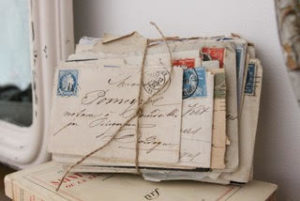
Whenever I teach Creative Nonfiction 101, I give my students a special assignment, a kind of show-and-tell for writers, to bring in a work of writing that moved them. Perhaps the most creative response came from the student who taught us a single word, saudade, a Portuguese term that is difficult to translate, meaning sadness tinged with yearning and a deep, penetrating ache.
My favorites, though, are the love letters.
It’s thrilling, right? To read someone else’s love letter, it’s like rummaging as a kid through your parents’ dresser drawers. But also, a really good love letter evokes memory, nostalgia, heat. Even when it recalls a relationship that ended badly, it stirs the few remaining embers that hold a warm, golden glow.
Take this line from a letter brought in by one of my students, who very generously agreed to let me share it here. Her beloved wrote it as she was boarding a plane to leave his country, never to see him again:
I have looked for you every time I’ve passed the corner of Bollyhope and Main. I’ll keep looking for you, even if the thought of doing it breaks my heart.
Or this, from the poet Paul Laurence Dunbar to Alice Moore, the writer who would become his wife, written in 1897 while he was on an extended trip to London:
Someday, when I can hold you in my arms and punctuate every sentence with a kiss and an embrace I may be able to tell you how happy your letter has made me. Happy and yet unhappy from the very strength of my longing to be with you…
And if you haven’t read the collected letters between the poets Elizabeth Barrett and Robert Browning, maybe now’s the time. Forced to conceal their relationship from Elizabeth’s disapproving father, they courted mostly by letter. After they married in secret and returned to their respective, separate, homes, Robert wrote one of the most famous love letters of all time, to his wife:
When the heart is full it may run over, but the real fullness stays within.
…
I am all gratitude and all pride, that my life has been so crowned by you.
Take every care of my life which is in that dearest little hand.
Notice how these writers don’t stop with “I love you,” nor do they resort to ornate, flowery prose. They tell you the very corner where they search for you, the very nape where they’ll plant a kiss.
Note, too, how they don’t give much ink to love itself. They reveal the depth of their feeling by describing the longing triggered by separation—the skin you can’t wait to touch, the girl you search for but never see.
Saudade, indeed.

Kelly Caldwell
Dean of Faculty


